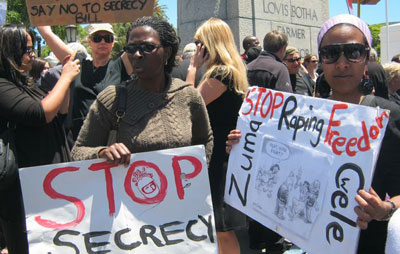New York, November 22, 2011–The South African National Assembly today passed an information bill which would sanction unauthorized possession and publication of classified state information with a prison term of up to 25 years, according to news reports. The Committee to Protect Journalists calls on the upper house of parliament to reject the bill, which has been criticized by Archbishop Desmond Tutu and former President Nelson Mandela, among others.
The ruling African National Congress, which controls two-thirds of the 400-seat National Assembly, recorded 229 votes in support of the Protection of State Information Bill, with 107 against and two abstentions, according to news reports. The upper house, the National Council of the Provinces, must approve the measure before President Jacob Zuma can sign it into law; the Council has power to reject the bill or make revisions, but such a move would be unusual, reports said. The upper chamber will likely take up the bill next year, the BBC said.
“The Protection of State Information bill will criminalize investigative journalism and deny South Africans a means to hold their leaders accountable,” said CPJ Africa Advocacy Coordinator Mohamed Keita. “We call on the upper house of parliament to reject the bill, which runs counter to the country’s constitution.”
Protesters, including journalists, rallied in major cities across South Africa to protest the bill today, a day they called “Black Tuesday,” likening the National Assembly’s passage of bill to the “Black Wednesday” in October 1977 when the Apartheid government silenced newspapers and dissent, according to news reports.
South African Security Minister Siyabonga Cwele, who introduced the bill in March 2010, has presented it as an amendment to an Apartheid-era law to safeguard state secrets and national security, and has claimed that it aims to curb espionage and not the media. However, clauses allowing officials unchecked discretion to classify information for the sake of vaguely-defined “national interest” and prison penalties for whistleblowers and journalists, without the possibility of raising public interest as a defense, drew considerable public opposition that led the ANC to delay the vote pending further public consultations. However, the party reintroduced the bill last week amid ongoing protests.
In November 16 remarks to parliament, Cwele said the party had narrowed the scope of classification from “national interest” to “national security,” but rejected demands to include a public interest defense for journalists. “We have looked at international best practices and there is no country which practices such reckless practice,” he said. In the same speech, he accused unspecified “foreign spies,” of funding “local proxies” to oppose the bill, which he said would criminalize “information peddling,” according to news reports. On Monday, Brian Dube, spokesman for South Africa’s State Security Agency, dismissed criticism of the bill as unfounded and sensationalist. “To argue that life under the Protection of State Information Bill will be characterized by censorship and information blackouts is sensationalizing of the highest order,” Dube told the press.
Prominent voices including Nobel Peace laureates Tutu and Mandela and Nobel prize-winning author Nadine Gordimer have condemned the bill. “It is insulting to all South Africans to be asked to stomach legislation that could be used to outlaw whistle-blowing and investigative journalism,” Tutu declared, according to press reports. In a statement, the office of ANC founder and former President Mandela also criticized the vote, saying “some aspects of the bill are unconstitutional,” according to news reports.
